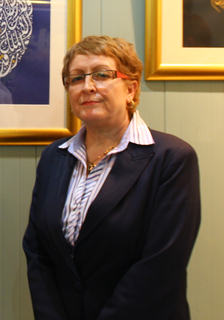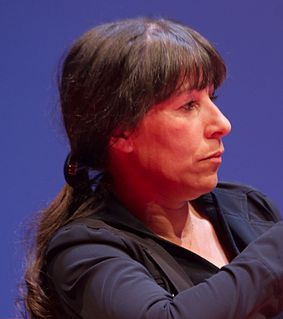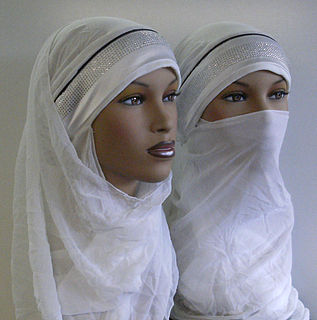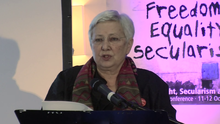
Fundamentalism usually has a religious connotation that indicates unwavering attachment to a set of irreducible beliefs. However, fundamentalism has come to be applied to a tendency among certain groups – mainly, although not exclusively, in religion – that is characterized by a markedly strict literalism as it is applied to certain specific scriptures, dogmas, or ideologies, and a strong sense of the importance of maintaining ingroup and outgroup distinctions, leading to an emphasis on purity and the desire to return to a previous ideal from which advocates believe members have strayed. Rejection of diversity of opinion as applied to these established "fundamentals" and their accepted interpretation within the group often results from this tendency.
Attitudes toward lesbian, gay, bisexual, and transgender (LGBT) people and their experiences in the Muslim world have been influenced by its religious, legal, social, political, and cultural history.
Secularism is the principle of seeking to conduct human affairs based on secular, naturalistic considerations. It is most commonly defined as the separation of religion from civic affairs and the state — which in accordance with religious pluralism defines secularism as neutrality on issues of religion as opposed to total opposition of religion in the public square as a whole — while other views may broaden it to a position concerning the need to remove or minimalize the role of religion in any public sphere. The term has a broad range of meanings, and in the most schematic, may encapsulate any stance that promotes the secular in any given context. It may connote anticlericalism, atheism, antitheism, naturalism, non-sectarianism, secularity, neutrality on topics of religion, or the (complete) removal of religious symbols from public institutions.
Islamic fundamentalism has been defined as a puritanical, revivalist, and reform movement of Muslims who aim to return to the founding scriptures of Islam. Islamic fundamentalists are of the view that Muslim-majority countries should return to the fundamentals of an Islamic state that truly shows the essence of the system of Islam, in terms of its socio-politico-economic system. Islamic fundamentalists favor a literal and originalist interpretation of the primary sources of Islam, seek to eliminate corrupting non-Islamic influences from every part of their lives, and see "Islamic fundamentalism" as a pejorative term used by outsiders for Islamic revivalism and Islamic activism.
Liberalism and progressivism within Islam involve professed Muslims who have created a considerable body of progressive thought about Islamic understanding and practice. Their work is sometimes characterized as "progressive Islam". Some scholars, such as Omid Safi, differentiate between "Progressive Muslims" and "Liberal advocates of Islam".
There exist a number of perspectives on the relationship of Islam and democracy among Islamic political theorists, the general Muslim public, and Western authors.

Khalida Toumi, aka Khalida Messaoudi, is an Algerian politician. She was the Minister of Communication and Culture until April 2014. She is also a feminist activist.
A combination of Islam and feminism was advocated as "a feminist discourse and practice articulated within an Islamic paradigm" by Margot Badran in 2002. Islamic feminists ground their arguments in Islam and its teachings, seek the full equality of women and men in the personal and public sphere, and can include non-Muslims in the discourse and debate. Islamic feminism is defined by Islamic scholars as being more radical than secular feminism and as being anchored within the discourse of Islam with the Quran as its central text. As a "school of thought", it is said to refer to Moroccan sociologist "Fatema Mernissi and scholars such as Amina Wadud and Leila Ahmed".

Fadela Amara is a French feminist and politician, who began her political life as an advocate for women in the impoverished banlieues. She was the Secretary of State for Urban Policies in the conservative Union for a Popular Movement (UMP) government of French Prime Minister François Fillon. She is a former president of the organisation Ni Putes Ni Soumises.

The Islamic scarf controversy in France, referred to there as l'affaire du voile, l'affaire du voile islamique, and l'affaire du foulard, arose in 1989, pertaining to the wearing of the hijab in French public schools. It involved issues of the place of Muslim women, differences between Islamic doctrine and Islamic tradition, the conflict between communitarianism and the French policy of minority assimilation, discussions of the "Islamist threat" to French society and of Islamophobia.

Maryam Namazie is a British-Iranian secularist, communist and human rights activist, commentator, and broadcaster.

The history of Islamic Principlism in Iran covers the history of Islamic revivalism and the rise of political Islam in modern Iran. Today, there are basically three types of Islam in Iran: traditionalism, modernism, and a variety of forms of revivalism usually brought together as fundamentalism. Neo-fundamentalists in Iran are a subgroup of fundamentalists who have also borrowed from Western countercurrents of populism, fascism, anarchism, Jacobinism and Marxism.
Secularism—i.e. the separation of religion from civic affairs and the state—has been a controversial concept in Islamic political thought, owing in part to historical factors and in part to the ambiguity of the concept itself. In the Muslim world, the notion has acquired strong negative connotations due to its association with removal of Islamic influences from the legal and political spheres under foreign colonial domination, as well as attempts to restrict public religious expression by some secularist nation states. Thus, secularism has often been perceived as a foreign ideology imposed by invaders and perpetuated by post-colonial ruling elites, and is frequently misunderstood and conflated as equivalent to irreligion or anti-religion.

The French ban on face covering is an act of parliament passed by the Senate of France on 14 September 2010, resulting in the ban on the wearing of face-covering headgear, including masks, helmets, balaclavas, niqābs and other veils covering the face in public places, except under specified circumstances. This ban does not apply to the hijab, as it does not cover the face. The ban also applies to the burqa, a full-body covering, if it covers the face. Consequently, full body costumes and Zentais were banned. The bill had previously been passed by the National Assembly of France on 13 July 2010. In April 2011, France became the first European country to impose a ban on full-face veils in public areas.

sister-hood is an international platform for the voices of women of Muslim heritage founded in 2007 by Norwegian, film-maker and human rights activist Deeyah Khan through her media and arts production company Fuuse.
Asma Lamrabet is a Moroccan doctor, Islamic feminist, scholar and author.

Ensaf Haidar is a Saudi-Canadian human rights activist. Born in Jizan, Saudi Arabia, Haidar is the wife of Raif Badawi, a Saudi writer, dissident and activist who was sentenced to ten years in prison and 1000 lashes in 2014. She actively campaigns for his freedom. Haidar is the President of the Raif Badawi Foundation for Freedom, that actively campaigns for freedom of speech and human rights awareness in the Arab World. She is running as the Bloc Quebecois candidate in Sherbrooke for the 2021 Canadian federal election.

Zakia Soman is a women's rights activist from India and one of the founding members of Bharatiya Muslim Mahila Andolan, a membership based human rights movement.
Ourida Chouaki was an Algerian women's rights activist. Founder of an association campaigning for reform to the Algerian Family Code she coordinated the 20 ans, barakat! which successfully brought about the replacement of the law in 2004. She also worked for the Marche mondiale des Femmes.
Women Living Under Muslim Laws (WLUML) is an international solidarity network established in 1984. It does academic and advocacy work in the fields of women's rights and secularism, focusing on the impact on women of laws inspired by Muslim religion or customs.









